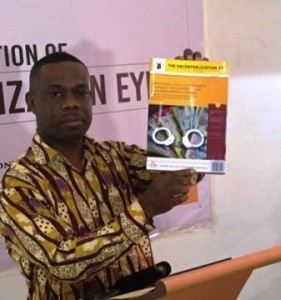Take “rich metropolitan assemblies” off common fund – CLGA

The Centre for Local Governance Advocacy has called on the Government to amend Article 252 of the 1992 Constitution and the District Assemblies’ Common Fund Act to take “rich metropolitan assemblies” off the fund.
According to the Centre for Local Governance Advocacy (CLGA), the District Assemblies’ Common Fund (DACF) Act of 1994 (Act 455) and the DACF distributing formula must be amended.
It said the formula used in allocating funds, as it stands now, inures to the benefit of the already rich metropolitan, municipal and district assemblies (MMDAs) than the MMDAs in the rural areas who badly need the funds for development.
Dr Eric Oduro Osae, a Board Member of the CLGA and a local government expert, who said this at the launch of the Fifth Edition of “Decentralisation Eyes” – a quarterly newsletter of the CLGA – noted that such rich MMDAs had huge untapped resource base and continuous transfer of the DACF to them was making them adopt a lackadaisical approach to resource mobilisation.
He mentioned Kumasi Metropolitan Assembly, Accra Metropolitan Assembly, Tema Metropolitan Assembly, Tamale Metropolitan Assembly, Cape Coast Metropolitan Assembly, and the Sekondi-Takoradi Metropolitan Assembly as some of the MMDAs that needed to be taken off the DACF.
“The infrastructural capacities of the newly created districts in 2012 is still crying for support, whereas some are still operating in rented premises, others are operating in only one apartment with almost all the staff living or being accommodated outside the assembly.
“We call on the Government to expedite action on capacitating the newly created districts with the requisite infrastructure and personnel to enable them to deliver on their mandate,” he said.
Dr Osae therefore congratulated the CLGA for yet another feat, most especially now that the Centre had acquired its own printing facility to help close the information gap on decentralisation implementation in Ghana.
The 48-page newsletter serve as a watchdog on local governance and decentralisation implementation in Ghana, and the fifth edition looked at the auditing and financial management challenges of the district assemblies in the Auditor General’s report, among other things.
Since its first publication in 2014, it continues to make strides by raising awareness through effective advocacy on issues of policy change and shift for improved local governance.
Mr Saaka Sayuti, a CLGA board member, said the newsletter highlighted issues of decentralisation through evidence-based research for public discourse.
He said: “Our survival and everyday life depends on how our local government system can provide our basic needs,” and commended the CLGA for its advocacy initiatives to bring to light issues that are not in public domain.
Source: GNA
